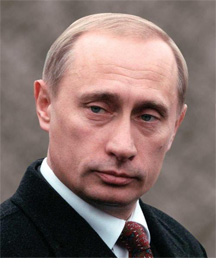WASHINGTON (Reuters) – Russia has forced the United States to close its aid mission in Moscow, the US government said yesterday, in a blow to US efforts to improve ties and a step that may aid the Kremlin’s crackdown on pro-democracy groups.

Russia gave the US Agency for International Development (USAID) until Oct 1 to cease operations after two decades and more than $2.6 billion spent to combat disease, protect the environment, strengthen civil society and modernize the economy.
In announcing the decision to close down the USAID operation in Russia, the State Department suggested the Russian government – which is earning high levels of oil revenues – felt that it should no longer be the recipient of such foreign aid.
Analysts also suggested a political motive: reducing foreign support for Russian groups that promote democracy and the rule of law but that are viewed with deep suspicion by the Kremlin.
Vladimir Putin, who served eight years as president until 2008 and then four years as prime minister, took office in May for a third presidential term after winning nearly two thirds of the vote in an election international monitors say was skewed in his favour.
In a sign of his reluctance to brook dissent, Putin has pushed through new laws to raise fines for protesters, stiffen punishments for defamation and put new controls on foreign-funded campaign groups.
Russian authorities have made clear for the better part of a decade that they see Russia as a great power and a provider of assistance, not a recipient,” said Matthew Rojansky of the Carnegie Endowment for International Peace. “Add to that tension over the pre- and post-election protests, which the Kremlin alleges were orchestrated by US-funded NGOs (non-governmental organizations), plus the deep disagreement over US democracy-promotion activities in the Middle East, and you can see why Russia may have taken this decision now,” he added.
While US President Barack Obama came into office seeking a “reset” in relations with Russia that bore some fruit, including a 2010 arms-control treaty, the two nations disagree on issues from the violence in Syria and Iran’s nuclear programme to US plans to build a missile defence shield and the Arab Spring.
In announcing the decision, the State Department said USAID will continue to promote democracy and civil society despite no longer having an office in Russia. A US government official said that the decision to close down the office would affect 13 US diplomats and 60 local Russian employees.
“The United States recently received the Russian government’s decision to end USAID activities in the Russian Federation,” department spokeswoman Victoria Nuland said in a written statement.
“While USAID’s physical presence in Russia will come to an end, we remain committed to supporting democracy, human rights, and the development of a more robust civil society in Russia and look forward to continuing our cooperation with Russian non-governmental organizations,” Nuland added.
Russian groups most affected include GOLOS, which monitors the conduct of elections, and Memorial, a human rights watchdog.
“The Russian government’s decision to end all USAID activities in the country is an insult to the United States and a finger in the eye of the Obama Administration,” Senator John McCain, an Arizona Republican, said in a statement.
“There should be no confusion as to why this decision was made: an increasingly autocratic government in Russia wants to limit the ability of its own citizens to freely and willingly work with American partners on the promotion of human rights, democracy, and the rule of law in Russia,” he added.
A senior Obama administration official voiced regret at the Russian decision.
“We lament the fact that we will not be able to do the work that we have been doing,” said the official, who spoke on condition of anonymity, adding that the US government would look for ways to support its policies activities in Russia.
USAID has a 2012 budget in Russia almost $50 million, more than half of which is spent on human rights and democracy work. About 40 percent of the overall funding goes directly to Russian organizations.




